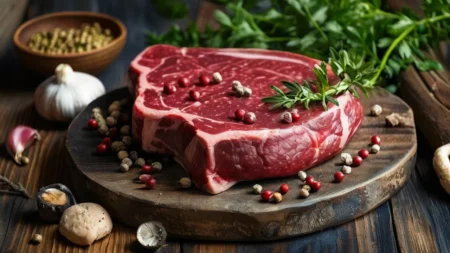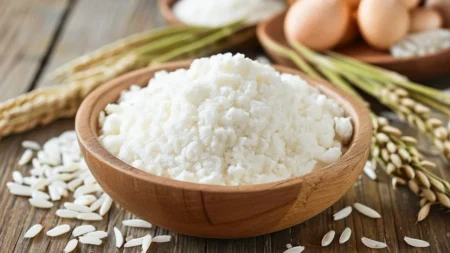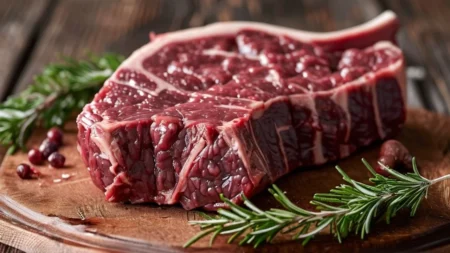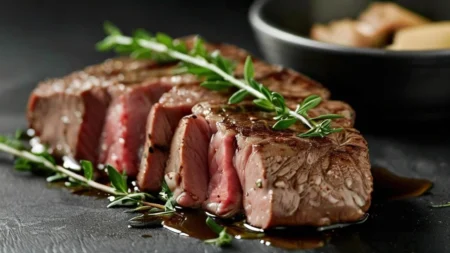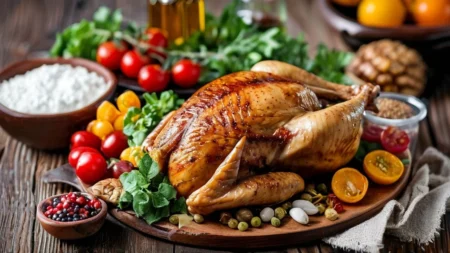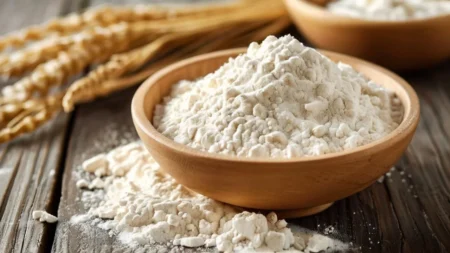Cornish Hens: A Delicious and Tender Delicacy
Key Takeaways:
- Cornish hens are small, tender chickens prized for their delicate flavor and juicy meat.
- Each hen typically weighs around 1-2 pounds, making them perfect for single servings or elegant meals.
- They are easy to cook and can be roasted, grilled, or braised, with a variety of herbs and spices for added flavor.
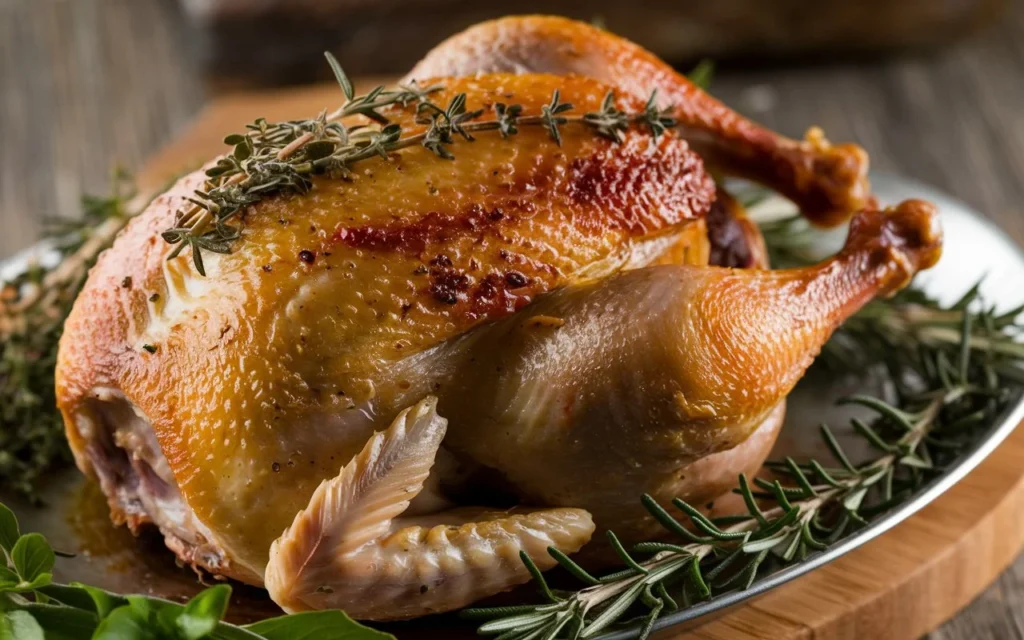
What Are Cornish Hens?
Cornish hens are a type of chicken, bred from a combination of Cornish and White Plymouth Rock breeds. They are smaller than typical chickens and are known for their tender, juicy meat. These hens are harvested young, usually around 5-6 weeks of age, and weigh between 1 to 2 pounds. Their small size and mild flavor make them ideal for gourmet dishes and individual servings.
Nutritional Information (Per 100g of Cornish Hen)
| Nutrient | Amount |
|---|---|
| Calories | 215 kcal |
| Protein | 18.5 grams |
| Fat | 15.2 grams |
| Carbohydrates | 0 grams |
| Cholesterol | 81 mg (27% DV) |
| Vitamin B6 | 0.4 mg (20% DV) |
| Selenium | 20.6 mcg (37% DV) |
Why Choose Cornish Hens?
Cornish hens are often selected for their unique characteristics that differentiate them from regular chickens. Here’s why they’re a popular choice for special meals:
1. Tender and Delicate Flavor
Because Cornish hens are harvested at a young age, their meat is exceptionally tender, making them perfect for those who prefer milder, less gamey flavors. Their delicate taste also makes them highly versatile in the kitchen.
2. Perfect for Individual Servings
The small size of Cornish hens makes them ideal for serving one hen per person, making them a popular choice for gourmet dinners, holidays, or special occasions. They are often served whole, creating an elegant presentation.
3. Cooks Quickly
Unlike larger chickens, Cornish hens cook much faster due to their smaller size. This makes them a time-efficient option for roasting, grilling, or even deep-frying.
Health Benefits of Cornish Hens
Cornish hens not only taste delicious, but they also offer a variety of health benefits, making them a great addition to a balanced diet.
1. High in Protein
With 18.5 grams of protein per 100 grams, Cornish hens are an excellent source of lean protein. Protein is essential for muscle repair, tissue growth, and maintaining a healthy immune system.
2. Low in Carbohydrates
Cornish hens contain zero carbohydrates, making them an ideal protein choice for people following low-carb or ketogenic diets. They provide essential nutrients without the need for high-carb sides.
3. Rich in Vitamins and Minerals
Cornish hens are packed with essential vitamins and minerals, particularly B vitamins such as vitamin B6, which supports metabolism and brain function. They’re also a good source of selenium, a powerful antioxidant that promotes a healthy immune system.
Cooking Methods for Cornish Hens
There are several ways to prepare Cornish hens, each highlighting their delicate flavor and tenderness. Here are some of the most popular methods:
1. Roasting
Roasting Cornish hens is one of the most popular cooking methods. Simply season the hens with your choice of herbs and spices, place them in the oven, and roast at 375°F for about 45 minutes. The result is a beautifully golden, crispy skin and tender, juicy meat.
2. Grilling
For a smoky, charred flavor, grilling Cornish hens is an excellent choice. Split the hens in half, marinate them in olive oil, garlic, and rosemary, and grill them over medium heat for about 25 minutes, turning once.
3. Braising
Braising Cornish hens involves slow-cooking them in liquid to enhance their tenderness. This method is great for adding depth of flavor, especially when using wine, broth, and aromatic herbs. Braise the hens on low heat for 1-1.5 hours.
Spice and Flavor Combinations for Cornish Hens
Cornish hens pair well with a variety of spices and herbs, giving you endless possibilities for flavor profiles. Here are some popular combinations to try:
1. Mediterranean Style
Rub the hens with a mixture of olive oil, lemon juice, oregano, thyme, and garlic for a classic Mediterranean flavor. Serve with roasted vegetables for a complete meal.
2. Cajun Style
For a bold and spicy kick, season the hens with a Cajun spice mix that includes paprika, cayenne pepper, garlic powder, and thyme. This style is perfect for grilling or roasting.
3. Asian-Inspired
Marinate the hens in soy sauce, ginger, sesame oil, and honey for an Asian-inspired dish. Serve with steamed rice and stir-fried vegetables.
Popular Dishes Featuring Cornish Hens
Cornish hens are featured in a variety of traditional dishes across different cuisines. Here are some popular ways they’re served:
1. Stuffed Cornish Hens
Cornish hens are often stuffed with a flavorful mixture of wild rice, cranberries, or herbs, making them a popular choice for holiday meals or special occasions. The stuffing adds extra flavor and richness to the dish.
2. Cornish Hens with Herb Butter
Brushing the hens with herb-infused butter before roasting is a classic way to enhance their natural flavor. Rosemary, thyme, and sage are often used in this simple yet delicious preparation.
3. Cornish Hens with Root Vegetables
Roasting Cornish hens with a medley of root vegetables like carrots, potatoes, and parsnips creates a hearty and balanced meal. The vegetables soak up the juices from the hens, adding even more flavor to the dish.
Conclusion
Cornish hens are a versatile and delicious option for anyone looking to enjoy tender, flavorful poultry. Whether roasted, grilled, or braised, these small birds provide a gourmet touch to any meal and are perfect for individual servings. With their high protein content, low carbohydrates, and essential vitamins and minerals, Cornish hens are as nutritious as they are tasty. Try them with your favorite herbs and spices for a meal that’s sure to impress.
FAQ
Q: How many Cornish hens should I serve per person?
A: Typically, one Cornish hen per person is recommended. Due to their small size, a single hen makes a perfect individual serving.
Q: Are Cornish hens healthier than regular chickens?
A: Cornish hens are nutritionally similar to regular chickens, but their smaller size makes them lower in calories per serving. They offer high protein and essential vitamins without the higher fat content of larger chickens.
Q: Can I cook Cornish hens from frozen?
A: Yes, Cornish hens can be cooked from frozen, but they will require a longer cooking time. It’s best to thaw them in the refrigerator overnight for even cooking.
Q: What’s the best way to season Cornish hens?
A: Cornish hens are versatile and can be seasoned with a variety of herbs, spices, and marinades. Popular seasonings include garlic, rosemary, thyme, lemon, and Cajun spices.
Q: How long do Cornish hens last in the refrigerator?
A: Fresh Cornish hens can be stored in the refrigerator for 1-2 days before cooking. If you’re not using them within this timeframe, it’s best to freeze them.





